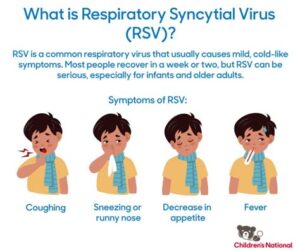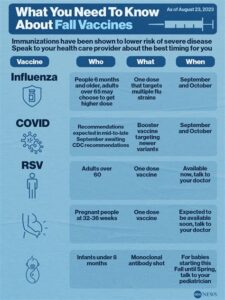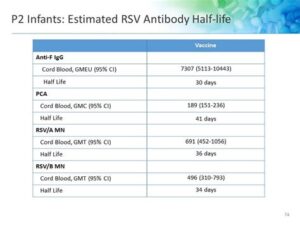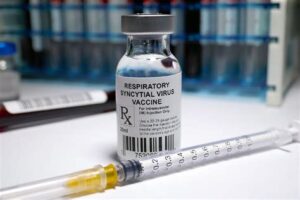Discover essential insights about the RSV vaccine, including common and uncommon side effects, and tips for managing reactions and seeking medical help.As the rollout of the RSV (respiratory syncytial virus) vaccine gains momentum, many people are curious about what to expect following vaccination. Understanding the potential reactions can help ease concerns and promote informed discussions with healthcare providers. This blog post will delve into the RSV vaccine, exploring the common and uncommon reaction symptoms, as well as strategies for managing any side effects you may encounter. Knowing how to identify and respond to these reactions is crucial, especially in a world where vaccine hesitancy persists. We’ll also discuss when it’s necessary to seek medical attention, ensuring you have all the information needed for a safe vaccination experience. Join us as we navigate the key aspects of RSV vaccine reaction symptoms to empower you on your health journey.
Understanding RSV Vaccine
The RSV vaccine is a critical advancement in the fight against respiratory syncytial virus (RSV), which is known for causing severe respiratory illnesses, particularly in infants and older adults. Understanding how this vaccine works is essential for caregivers and healthcare providers alike.
The primary goal of the RSV vaccine is to stimulate the body’s immune system to recognize and fight off RSV. The vaccine does this by introducing a harmless component of the virus, allowing the immune system to develop defense mechanisms without causing the disease itself. This is particularly important for vulnerable populations who are at a higher risk of serious health complications.
Clinical trials have proven that the RSV vaccine can significantly reduce the incidence of RSV infections, leading to fewer hospitalizations and complications related to this virus. It’s important for eligible individuals, especially those in high-risk groups, to discuss vaccination options with their healthcare providers to ensure the best protective strategies are in place.
Common Reaction Symptoms
The RSV vaccine is designed to provide protection against the respiratory syncytial virus, particularly in vulnerable populations such as infants and the elderly. While it is generally considered safe, like any vaccination, it can cause a range of reactions. It is important to be aware of the common reaction symptoms that may occur after receiving the vaccine.
- Injection site reactions: Pain, redness, or swelling at the site of the injection are common.
- Fever: A mild fever may develop, typically resolving within a couple of days.
- Fatigue: Feeling tired or fatigued is a common complaint following vaccination.
- Headache: Some individuals report headaches after receiving the vaccine.
- Muscle aches: Mild muscle aches may also occur as part of the body’s response to the vaccine.
It’s essential to keep in mind that these common symptoms are generally mild and temporary. The body is simply responding to the vaccine and developing immunity against RSV. However, monitoring your health after vaccination can help identify a
Uncommon Reaction Signs
When it comes to the RSV vaccine, most reactions are mild and temporary. However, it’s important to be aware of uncommon reaction signs that may indicate a more serious issue. These signs, though rare, warrant prompt attention to ensure the health and safety of the vaccinated individual.
- Severe allergic reactions, including anaphylaxis
- Persistent high fever
- Unusual bruising or bleeding
- Neurological symptoms such as severe headaches or changes in behavior
- Swelling at the injection site that spreads beyond the arm
It’s crucial to monitor for these uncommon signs following vaccination. If any of these symptoms occur, seeking immediate medical attention is recommended. Always consult with a healthcare professional if you have any concerns about the vaccine or its reactions.
Managing Vaccine Side Effects
When receiving the RSV vaccine, it’s important to be prepared for potential side effects. Most side effects are mild and temporary, but understanding how to manage them can improve your overall experience. Common reactions can include soreness at the injection site, fatigue, and mild fever. Here are some strategies to help you manage these symptoms effectively.
1. Pain Relief: If you experience pain or discomfort at the injection site, over-the-counter pain relievers such as ibuprofen or acetaminophen can provide relief. Be sure to follow the dosage instructions on the label or consult with your healthcare provider.
2. Hydration: Staying well-hydrated can help alleviate feelings of fatigue. Drink plenty of fluids, particularly water, to keep your body functioning optimally. Avoid alcohol and caffeinated beverages as they can lead to dehydration.
3. Rest: Ensure you take time to rest and allow your body to recover. A good night’s sleep can significantly boost your immune system and help mitigate side effects.
4. Cool Compress: If you have swelling or redness at the injection site, applying a cool compress can help soothe the area. This can minimize discomfort and promote healing.
While managing these common side effects is generally straightforward, it’s important to monitor your symptoms and consult with a healthcare professio
Seeking Medical Attention
After receiving the RSV vaccine, it’s crucial to be aware of when to seek medical attention. While most individuals may experience mild side effects that resolve on their own, there are certain warning signs that should not be ignored. Understanding these signs can help ensure your safety and the effectiveness of the vaccine.
Common mild reactions can include soreness at the injection site, fatigue, or a low-grade fever. These symptoms typically subside within a few days. However, if you experience symptoms such as difficulty breathing, swelling of the face or throat, or a rapid heartbeat, it’s essential to seek medical attention immediately. These could indicate a more serious allergic reaction.
In cases where you notice a persistent high fever, severe headache, or unusual bruising or bleeding, don’t hesitate to consult a healthcare professional. Early intervention can prevent complications and ensure a more positive outcome. Always prioritize your health by staying informed about your symptoms and knowing when it’s time to get help.
Frequently Asked Questions
What are common symptoms of a reaction to the RSV vaccine?
Common symptoms of a reaction to the RSV vaccine may include mild fever, fatigue, headache, soreness at the injection site, and in some cases, mild respiratory symptoms.
How severe are the reactions to the RSV vaccine?
Most reactions to the RSV vaccine are mild and typically resolve on their own within a few days. Serious reactions are rare.
What should I do if I experience a severe reaction after receiving the RSV vaccine?
If you experience severe symptoms such as difficulty breathing, swelling of the face or throat, or a rapid heartbeat, seek medical attention immediately.
Are there any groups at higher risk for adverse reactions to the RSV vaccine?
Individuals with a history of severe allergic reactions to vaccine components might be at higher risk and should consult their healthcare provider before vaccination.
How long do vaccine reaction symptoms typically last?
Most vaccine reaction symptoms last for a few days; however, if symptoms persist longer, it’s advisable to consult a healthcare professional.
Is it safe to receive the RSV vaccine if I have a mild illness?
Generally, it is safe to receive the RSV vaccine if you have a mild illness like a cold, but it’s best to consult with your healthcare provider for personalized advice.
What should I monitor after getting the RSV vaccine?
After receiving the RSV vaccine, monitor for any unusual symptoms or reactions, particularly within the first 48 hours, and report any concerns to your healthcare provider.





